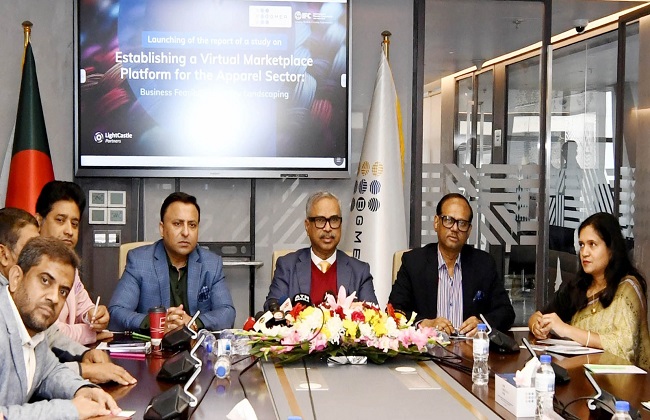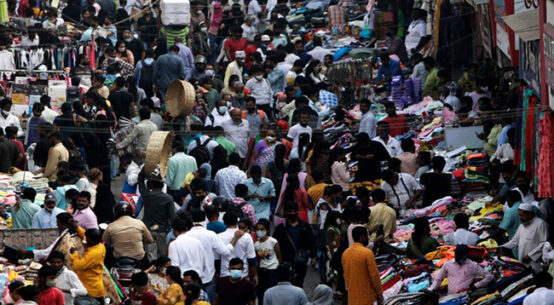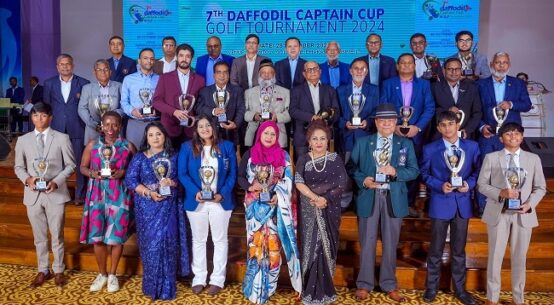
The RMG sector of Bangladesh has solidified its status as the second-largest apparel exporter globally. Despite this triumph, the sector faces challenges due to global geopolitical tensions, exchange rate fluctuations, dollar crisis, surge in cotton price, aggravated by intense competition from low-cost nations.
To this end, digital transformation has emerged as one of the pivotal enablers. Nevertheless, limitations arising from the regulatory framework, particularly in the realm of cross-border transactions and foreign currency policies, serve as an impediment for the domestic apparel industry to tap into the global burgeoning e-commerce market.
In light of these challenges, Bangladesh Garment Manufacturers and Exporters Association (BGMEA) commissioned LightCastle Partners to conduct a comprehensive feasibility study as a precursor to developing a virtual platform tailored for Bangladesh’s textile and apparel sector.
The findings of this study were officially unveiled at the BGMEA headquarters in Dhaka on 25 January.
The report meticulously identifies market potential and sector readiness to digitise the apparel sector of Bangladesh. The study also proposes sustainable business models along with policy gaps, and necessary requisite strategies essential for the successful implementation of the marketplace.
The primary objective of the virtual marketplace is to integrate the local textile industry into global value chains and capitalise on the shift towards online purchasing. The report emphasises two critical strategic approaches for the sustained success of the apparel sector: (1) Expansion of current Business-to-Business (B2B) activities into emerging markets like Asia and Middle East and (2) Creation of additional value by establishing direct connections between Bangladeshi manufacturers and end customers (B2C), thereby achieving superior profit margins and increased volume of business.
The platforms will operate as independent private entities, incorporating features such as logistical assistance, design consultation services, secure payment systems, and spare capacity matching, among others.
Nevertheless, in contrast to the well-defined National Digital Commerce Policy of 2018 governing the domestic market, there exists no explicit policy framework addressing international e-commerce. To elaborate, the absence of global payment gateways, challenges in securing working capital financing, cumbersome export processing for small orders, and an impractical return policy (where returns are categorised as imports) constitute substantial impediments to establishing a robust digital marketplace.
Furthermore, the report underscores the virtual marketplace’s potential to serve as a central hub for stock lots, streamlining connections among local producers, traders, and international buyers in emerging markets.
Speaking at the study launch event, Faruque Hassan, President of BGMEA, said “If we want to maintain our position in the global competition ahead, we need to develop a comprehensive business model. This report, I believe, will not only facilitate the expansion of our presence in the digital realm but also serve as a guiding framework for our future business expansion endeavours.”
Shahidullah Azim, Vice President, BGMEA, Directors of BGMEA Abdullah Hil Rakib, Navidul Huq and Md. ImranurRahman, Shovon Islam, Chair of BGMEA Standing Committee on Press, Publication and Publicity, Mohammed Kamal Uddin, Chair of BGMEA Standing Committee on Trade Fair, and Chair of BGMEA Standing Committee on UD-Woven & Knit Md. Nurul Islam attended the event.
The launch event was also attended by Nishat ShahidChowdhury, Program Manager IFC-Pact, and key officials from LightCastle Partners, including Zahedul Amin, Co-founder and Director, Dipa Sultana, Senior Business Consultant and Project Manager, Priyo Pranto, Business Consultant and Naziba Ali, Business Analyst.
The study is funded by IFC’s Partnership for Cleaner Textile (PaCT II) program and supported by the government of Denmark through the Danish International Development Agency (DANIDA).


